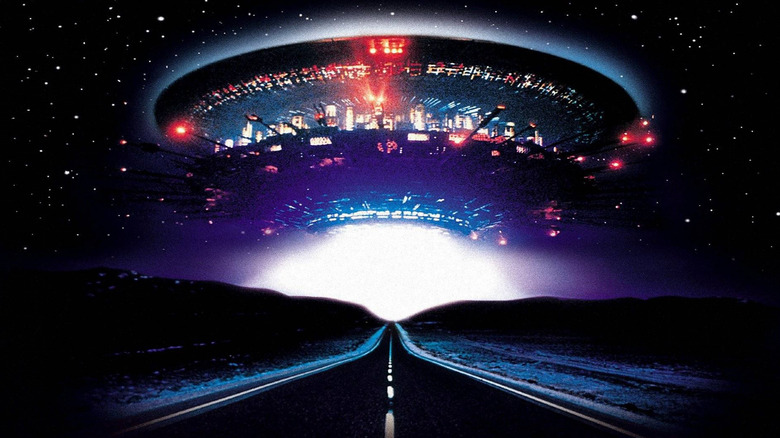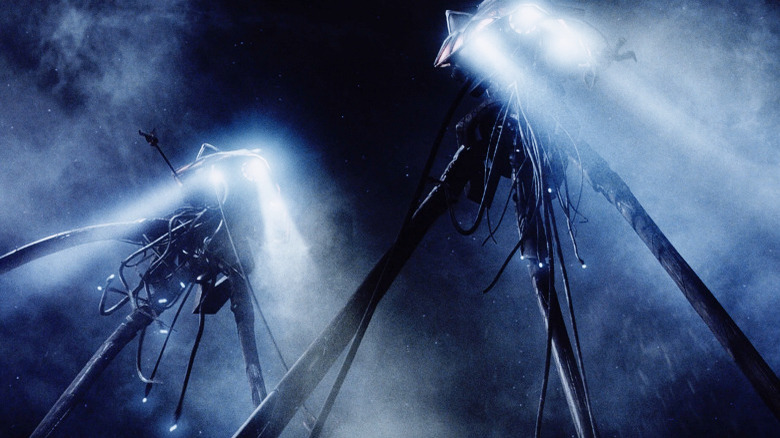The Real-Life Moment That Made Steven Spielberg Fall In Love With Space
One of the key traits that sets Steven Spielberg's best blockbusters apart from other tentpoles is their sense of awe for the natural world. Even "Jaws" and "Jurassic Park" treat the dangerous creatures at the heart of their stories with a blend of fear and wonder, as opposed to seeing them as nothing more than human-snacking monsters. The same could be said for how Spielberg portrays outer space in his movies. As worlds apart (no pun intended) as the aliens in "Close Encounters of the Third Kind" and "War of the Worlds" are in terms of their plans for humanity, Spielberg takes the time in both films to acknowledge just how incredible their mere existence is. It turns out that approach was sparked by a real-life moment in Spielberg's history.
In a 2005 interview (via The Spokesman-Review), Spielberg traced his reverence for outer space to an event from his childhood:
"I first became aware of the sky when my father pointed out the Perseid meteor shower to me when I was about 6 years old, living in Haddon Heights, N.J. My father really held the key to the universe, which unlocked my imagination."
The director spoke about this incident in greater detail for Joseph McBride's book, "Steven Spielberg: A Biography," explaining:
"I didn't know what was happening. It was frightening. My mom wasn't with me. So I thought, 'What's happening here?' [My dad] had a thermos of coffee and had brought blankets, and we drove for about half an hour. We finally pulled over to the side of the road, and there were a couple hundred people, lying on their backs in the middle of the night, looking up at the sky. My dad found a place, spread the blanket out, and we both lay down.
"He pointed to the sky, and there was a magnificent meteor shower. All these incredible points of light were criss-crossing the sky. It was a phenomenal display, apparently announced in advance by the weather bureau. My dad had really surprised me – actually, he's frightened the hell out of me! At the same time, though, I was tremendously attracted to the source, to what was causing this."
How Spielberg Portrays Visitors From Space
That feeling Spielberg described in these accounts (being scared yet amazed at the same time) would, as mentioned earlier, filter into his sci-fi movies as a director. "Close Encounters of the Third Kind" is perhaps the best reflection of this dichotomy. In scenes like the one where Jillian Guiler's young son, Barry, is taken by the film's aliens, these other-worldly visitors are represented by the alarming sight of fiery orbs emerging from billowing storm clouds. Yet, as these beings descend upon Devils Tower in the movie's climax, their spacecrafts give rise to a celestial spectacle that culminates with the arrival of the mothership, itself a gorgeous cylindrical vessel decked out in vivid lights.
Five years after "Close Encounters," Spielberg revisited the idea of aliens coming to Earth with 1982's "E.T. the Extra-Terrestrial." Unlike "Close Encounters," however, "E.T" offers a clear look at the ship that brought its namesake to our humble blue dot some 30 seconds after the film's opening credits. As with E.T. himself, there's a mystical and magical quality to the spherical machine, which is the sole source of light in a darkened California forest at night. And much like the aliens in "Close Encounters," E.T. initially spooks the people he comes into contact with, only to win them over with his gentle and wondrous nature.
Of course, it's a whole other story with 2005's "War of the Worlds," a film which — like most of his movies in the early 2000s — tapped into Spielberg's anxieties and concerns in the wake of 9/11. As with H.G. Wells' source material, the aliens here are terrifying forces bent on claiming Earth as their own. All the same, scenes that depict one of their war machines or "tripods" emerging from beneath the ground and, later, "tripods" flipping over a huge ferry on the Hudson River retain that familiar mix of terror and reverence. Even in his darkest work, Spielberg the storyteller can't help but marvel at the wonders that emerge from the sky.

